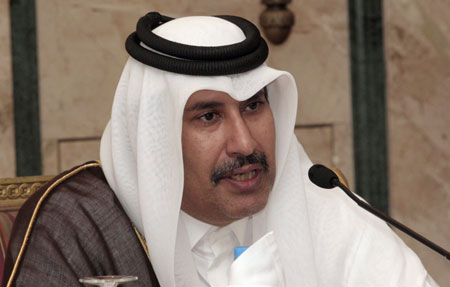Lebanese to hold crisis talks in Qatar
(Agencies)
Updated: 2008-05-16 10:13
Updated: 2008-05-16 10:13
BEIRUT - Rival Lebanese leaders are scheduled to talks in Qatar on Friday aiming to end a protracted political conflict that pushed the country to the brink of a new civil war.
 Qatari Prime Minister Sheikh Hamad bin Jassim bin Jaber al-Thani speaks during a news conference in Beirut May 15, 2008. An Arab League delegation said on Thursday it had concluded a deal with rival Lebanese leaders to end fighting in the country and called on them to attend talks to resolve a broader political crisis in Qatar on Friday. [Agencies] |
Leaders of the ruling coalition and the opposition will try to forge a deal to end the standoff which has paralysed government for 18 months and left Lebanon without a president since November.
An Arab League mediation mission sealed an agreement on Thursday which ended fighting between ruling coalition supporters and Hezbollah.
The sides agreed to talks in Doha as part of the deal.
Hezbollah, a Shi'ite military and political group, had routed its opponents in battles that killed 81 and inflamed sectarian tensions with Sunni and Druze followers of the governing coalition.
Hezbollah's military gains -- a blow to the United States, Saudi Arabia and other backers of the government -- have forced the government to rescind two decisions which the group had said amounted to a declaration of war.
The ruling coalition also appears to have dropped its demands that the election of a new president precede discussions on a new cabinet and a new parliamentary election law -- the two main issues on the agenda of the Qatar talks.
"At the Doha conference, there will be an opportunity for everyone to give his opinion on all the issues," Qatari Prime Minister Sheikh Hamad bin Jassim bin Jabr al-Thani said on Thursday in Beirut, announcing the talks.
The opposition has demanded more say in a cabinet controlled by factions opposed to Syrian influence in Lebanon.
The ruling coalition's refusal to yield to the opposition's demand for veto power in cabinet triggered the resignation of all its Shi'ite ministers in November 2006. Lebanon was plunged into its worst political crisis since the civil war.
A deal would lead to the election of army commander General Michel Suleiman as president. Both sides have long accepted his nomination for a post reserved for a Maronite Christian in Lebanon's sectarian power-sharing system.
Under a deal, the opposition would also remove a protest encampment that has closed off central Beirut since December, 2006.
|
||
|
||
|
|
|
|
